Ray Peat's Marmalade?
-
Has anyone made Ray Peat's Orange Marmalade? I've been simmering it all day and it's not marmalade texture, just a bunch of soggy orange peels and pulp in water. I have a feeling I messed something up.
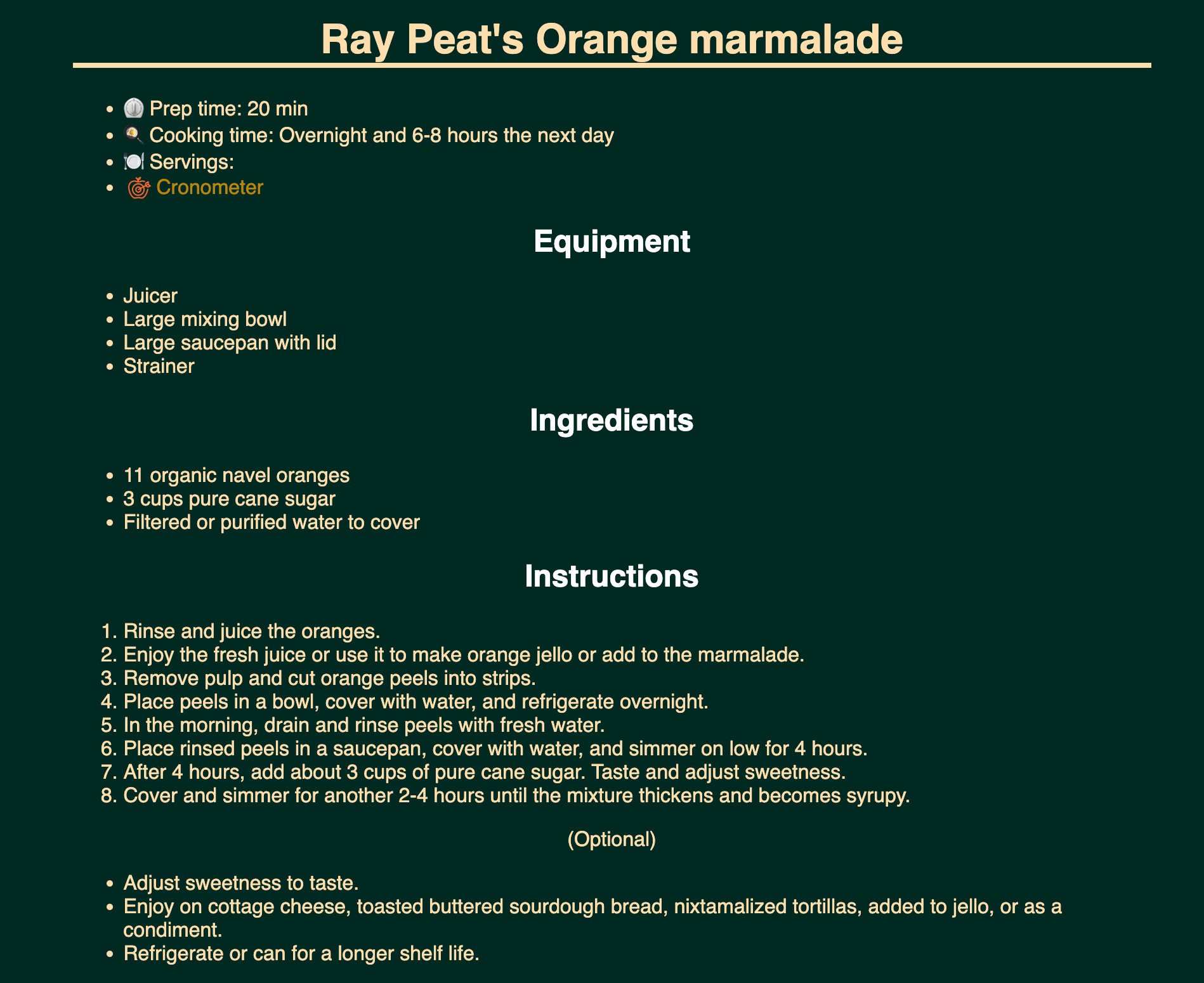
-
@brad Sounds like maybe too much water. It should thicken up nicely once you add the sugar in.
-
@brad Commenting to follow. I unfortunately had the same result. Taste was great but texture was off. Retrospectively I should have just added gelatin to give it the needed consistency
-
@Peatriot I added the sugar. Probably way too much water. Also, consistency seems way off, not sure if I cut the peels thin enough. Is there some way to fix? Boil off the water, add gelatin, and blend it all together?
-
Maybe try straining and muddling the peels a bit. I think strips are better suited to making something like a limoncello(peaty).
-
Sounds like a sticky situation laddie. There is a lad on here with the opposite problem, too thick. But it isn't marmalade he's making laddie.
Your problem is common enough my boy, many have been known to add pectin to thicken up their marmalade. Back in my sailing days we made due with the oranges we could get in port, and there were many a dinners had with runny marmalade over toast. It won't kill you laddie. But you can boil the peels a bit before the overnight refrigeration to draw out more pectin.
-
This is what I basically followed when I last made some, seemed alright, https://thenutritioncoach.com.au/naringenin-inhibiting-inflammation-with-marmalade/
-
@Peatriot but if I strain I lose all of the delicious sugar orange water that I've been painstakingly distilling since before this forum existed...
@torporade The recipe makes sense. I made the mistake of not scooping the pulp or cutting into thin enough strips. Not a mistake I'll repeat, I'll tell you that much.
I think I'll keep boiling off the excess water and then accepting the fact that my strips are bulky.
-
@brad or should I use an immersion blender? Idk
-
@brad For everyone who was worried about my marmalade, I'm happy to report it was salvaged. I just added a bunch more sugar, simmered off the fluid, and muddled it a bit. Next time I'll cut into strips but this is quite tasty. A bit more bitter than I expected. Mixing it with citrus and more sugar is delicious, and there's an intriguing, complex aftertaste.
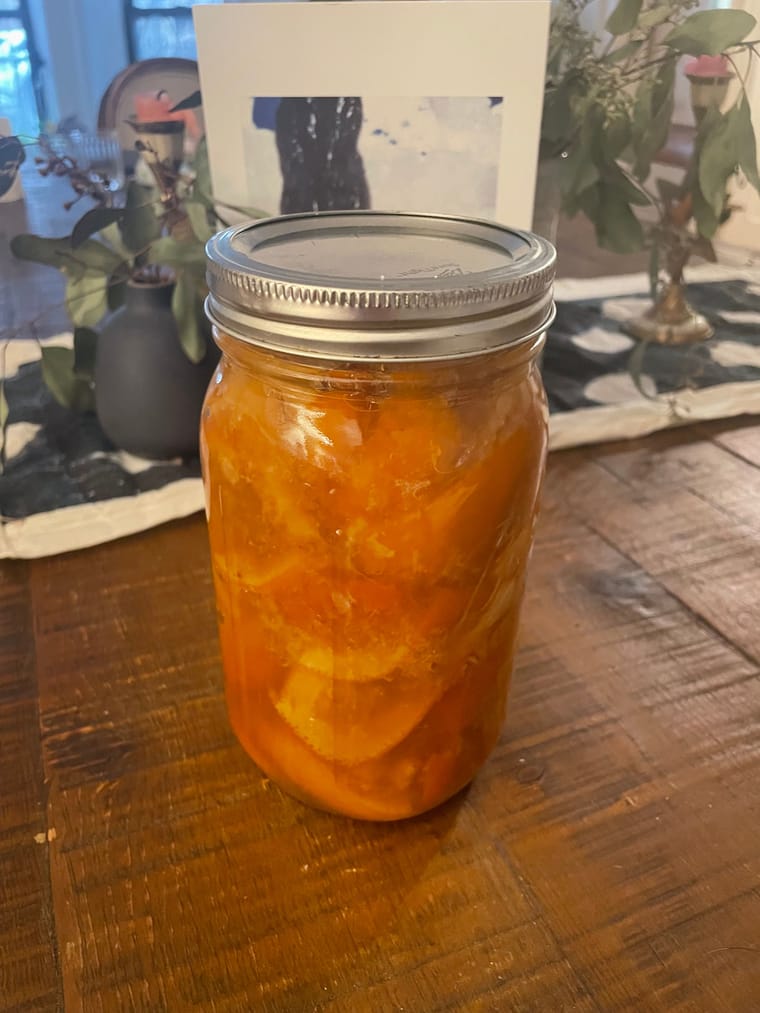
-
I made this some time ago (I dont know if it was this exact recipe, I found mine on then twitter), but it was very bitter, with sugar it was ok, but it still had a way too strong orangey taste. Threw out most of it, because I couldnt stomach it

-
@gugenmungus I saw @Pillman's recipe on twitter and it seems like I could have doubled or tripled the amount of sugar and added a lemon. I think that would improve the taste.
-
@brad this is what I used
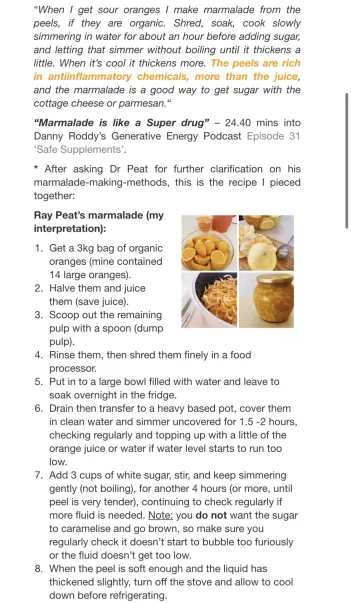
-
If you get tired of the marmalade, you can juice the oranges and then candy the peels through a similar process with less water at the end of cooking. I find it easier to peel the oranges with a vegetable peeler and then juice the oranges after. If you dust them with sugar while they dry, they become similar to other dried fruits you might find at the store.
-
Making the marmalade this weekend....wish me luck.
-
If you think of it..
- Polyphenols: toxins (Smith, 2023)
- Carotenoids: toxins (Genereux & Smith, 2018)
- Refined sugar: toxic (Smith, 2016)
- Pectin: antidote (purges bile and purifies our soul) (Smith, 2023)
But Ray isn't fond of the latter:
"I discard most of the white material, my marmalade doesn’t gel. The high temperatures of pressure cookers cause tastes that I don’t like." (from an email exchange)
This leaves us with a destructive bomb that's better discarded too. #toxicbileapocalypse
Excess fructose could be problematic if not absorbed:
High Intake of Sugar and the Balance between Pro- and Anti-Inflammatory Gut Bacteria
"The observed microbial changes induced by high dietary sugar, i.e., reduced diversity, increased abundance of Proteobacteria and decreased abundance of Bacteroidetes [6], share common features with microbiota dysbiosis associated with metabolic disorders, inflammatory bowel diseases (IBD) and other human disorders [1,3,7]. Excess monosaccharides that are not absorbed in the small intestine can favor organisms that can rapidly utilize simple carbohydrates, such as Proteobacteria, at the expense of other commensals, which are specialized in degrading complex carbohydrates and generally have slower growth rates [8]."
"Bacteroidetes and Firmicutes are the two most abundant bacterial phyla in healthy adult microbiota. Bacteroides, a predominant genus within Bacteroidetes, is well adapted to the competitive gut environment and utilization of complex plant- and host-derived polysaccharides [13,14]."
But as sucrose, it shouldn't be an issue. And the pectin would help to minimize the dependence on host's mucosal carbohydrates.
"Our pilot dietary intervention study showed that switching to a low fiber, high simple-sugar diet for a short period can trigger GI and systemic symptoms that improve upon resuming baseline diet. The correlation of decreased microbial diversity with increased duodenal permeability and appearance of symptoms suggests that this effect may be driven at least in part via gut microbiota. The deleterious effect of a low-fiber diet on microbial diversity and host function has been well described previously[31] and our findings support that notion. We found acetate and butyrate to be reduced with the low fiber, high simple-sugar diet. These microbial fermentation products are a key energy source for intestinal epithelial cells and play an important role in epithelial barrier integrity[32] and enteropathogen exclusion[33]."
The more unique a carbohydrate is, the more predictable it tends to be in selecting microbes that thrive on it, serving to replace undesirable ones. But carbohydrates with a generic structure can be erratic, and the reaction depends on the predisposition of the existing community.
The Bitter Pith Myth | American's Test Kitchen
"Despite its reputation, the cottony white layer of pith on citrus fruits (grapefruit excepted) isn’t bitter. In fact, it’s completely flavorless. (It’s true—slice off a piece and try it for yourself.) And the zest tastes only subtly bitter.
So why does your homemade lemonade sometimes turn out bitter?
It happens when the pith and zest are abraded together, as they often are when preparing citrus-based drinks: Acid and enzymes convert the peel's flavorless compounds into new ones with pronounced bitterness.
If you aren’t going to be rubbing the two substances together, don’t worry about leaving some pith on your zest. But if you are, as in our Lemonade Concentrate recipe, we recommend using a vegetable peeler to harvest the zest with minimal pith. This zest will impart just enough bitter flavor to add complexity, but not enough to obscure the drink’s sweet-sour balance.
-
@brad I didn't know abt this recipe but I make a very similar one about once a week to have with cheese.
You have to cut the parts small/thin enough to not have it take too long, but thick enough to get the right texture. I usually boil 3 orange peels (the only thing i remove is the flesh, because it makes the texture too mushy) in their juice, add a whole bunch of sugar and then at the end add some lemon juice. Funny how similar this is without me knowing about it. I had a picture but lost it
Like others said, the main thing is to add the correct amount of water so that you end up with a marmalade/syrup consistency basically.
-
I actually don't even add all the juice depending on how much comes out. takes me a little over 5 hours to get it perfect. Maybe the shorter cooking time is why it's not that bitter (just the right amount imo)
-
@catharsis Candying the peels is great! If you have an oven that goes down to 60C (if you don't, you can prop the door open) it's quite fast and easy to candy things. At least the dehydration part of the process.
What I really wanna try is to make Belgian Orangettes in one of these ways. The latter seems harder but I used to love them as a kid:
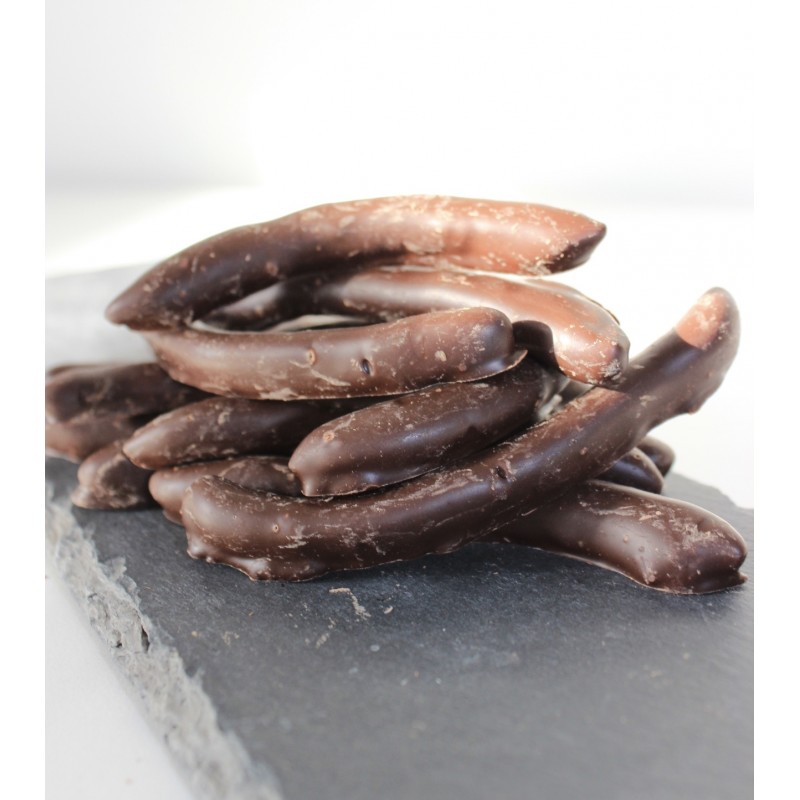
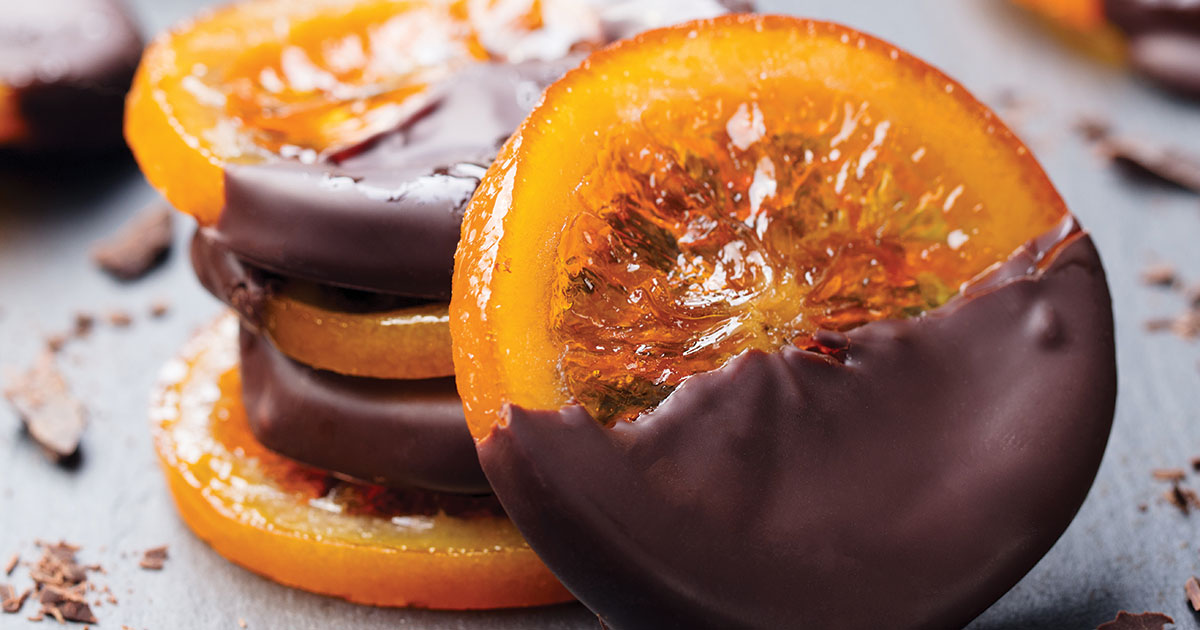
Will probably do it very soon.
-
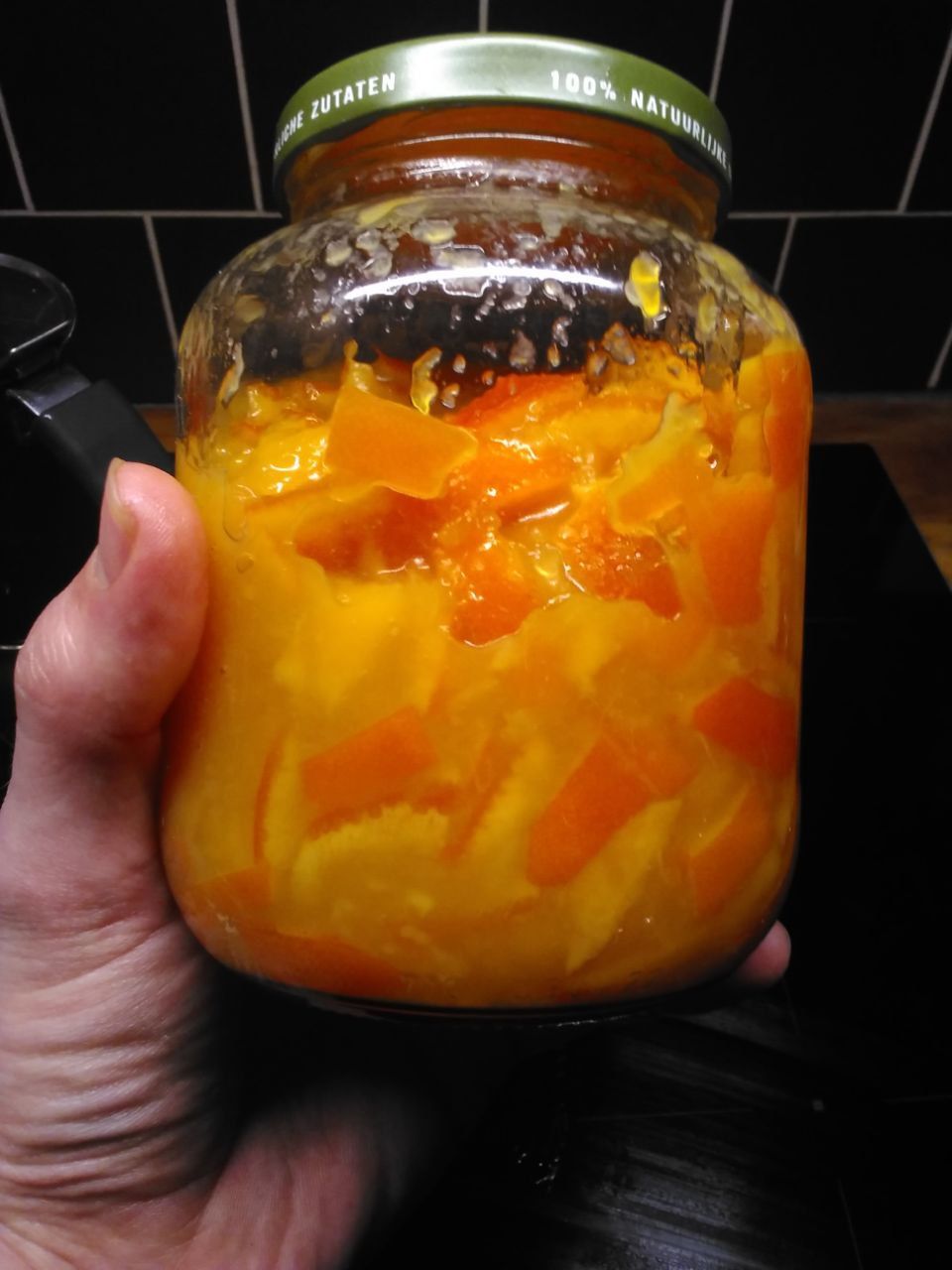
Just made this. A little over 5 hours I think! More of a bite than some people like. Like Ray said, it's not one big solid block like with a lot of commercial marmalade. Sugar, orange, the juice of the oranges, tiny bit of water and some lemon juice at the end. Delicious on some Caprice Des Dieux cheese.